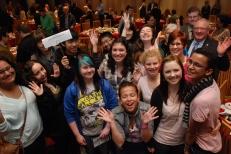A 400-plus crowd at an annual anti-homophobia breakfast gave a rousing ovation to a delegation of Burnaby students who are fighting to introduce a gay-friendly policy in their district’s schools.
“That felt really, really good,” said 15-year-old Burnaby high school student Travon Hart. “I didn’t expect that at all. To be acknowledged for something that we are dealing with is a big thing.”
The struggle in Burnaby was referenced throughout the morning and brought a sense of passion, purpose and unity to the seventh edition of the International Day Against Homophobia Breakfast hosted by Qmunity, BC’s Queer Resource Centre, on May 17.
Just a week ago, about 300 placard-waving opponents and supporters of the proposed anti-homophobia policy got into a tense confrontation outside the Burnaby School Board office. While critics of policy 5.45 say it would infringe on parents’ rights, sexualize schools and is being pushed by proponents of a leftwing ideology, its supporters say it’s a key element in combating homophobia’s verbal and physical manifestations in schools.
“It was just great to see so much support from everybody in the room,” said Burnaby School Board chair Larry Hayes, who along with fellow school trustees has been inundated with feedback for and against the policy since it was recently released in draft form.
“It makes us from the board in Burnaby feel that [while] there may be a very vocal minority out there that are fighting against us and this policy, this community and the community in general is on our side,” Hayes added.
Tuesday’s crowd was the breakfast’s biggest draw to date. City councillors, police, school board trustees, corporate and community sponsors and Vancouver Centre MP Hedy Fry were all on hand for the event. It was also the first time the breakfast, hosted at Floata Restaurant in Chinatown, was held outside of Vancouver’s West End.
“We wanted to embrace all aspects of the queer community, and that includes recognizing many of our Asian roots,” Qmunity’s executive director Jennifer Breakspear said.
The day was also honoured at city hall with Vancouver Mayor Gregor Robertson declaring May 17, 2011, “International Day Against Homophobia” in Vancouver.
While the original theme of the breakfast was same-sex marriage, the event’s organizers decided in the end to embrace a broader concept of queer relationships.
“We felt that the same-sex couples theme was too restrictive; it left people out,” Breakspear noted. “We believe that the queer umbrella is quite inclusive, and anyone who feels they fall under that umbrella is part of our family,” she added.
The diversity of speakers reflected that commitment. Topics varied from polyamory to homosexual persecution in Asia to raising gender-variant children in Canada.
Kiki Christie, founder of Victoria Poly 101, challenged the audience to reconsider the heteronormative ideas that dominate society’s view of partnerships. She highlighted social networking site Facebook and its limited relationship option tags as a prime example of how “couple normative” ideas permeate society and limit the choices of those who might identify differently.
“As open relationships become increasingly public and politicized, we are in need of a new cultural relationship model that is distinct from monogamy [and] that still demonstrates the values of love, commitment and security that are important to all of us,” she added.
Moving from the local to the global, Ben Indra and Dan Shepherd, who teleconferenced from Singapore, related their touching story of love and loss in their fight to maintain a relationship in Indonesia, where homosexuality is against the law. The crowd was moved when Shepherd revealed that they had finally been granted status to live together in England.
“We have been able to save our relationship because we left Asia, but there is still a huge amount of work that needs to be done in Asia,” said Shepherd.
“We are the lucky ones,” Indra added.
“It reminded me that just because you can get married in Canada now doesn’t mean that we should be passive,” said Tanya Paz, a breakfast guest. “There is still a lot of work to be done internationally.”
The morning’s final speaker, Simon Fraser University sociology professor Dr Ann Travers, told guests that children are the ones facing the brunt of homophobia in Canada.
“Children are often the real gender outlaws, and the price they pay for their transgression can be incredibly steep,” she noted. “There are no laws to protect them from gender coercion and gender policing.”
She said respected Canadian psychiatric institutions continue to treat gender identity disorder in children with coercive and emotionally abusive corrections.
Travers brought many to tears when she shared her struggles and that of her son, who enjoys ballet and prefers to wear pink outfits and to grow his hair long.
“In our interactions with, and observations of, children, let’s stop expecting and reinforcing girl behaviour for girls and boy behaviour for boys,” Travers urged.

 Why you can trust Xtra
Why you can trust Xtra


